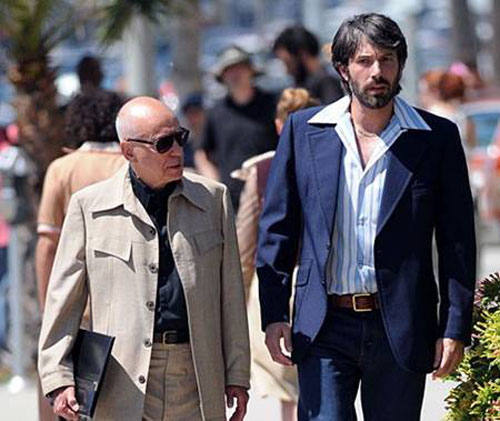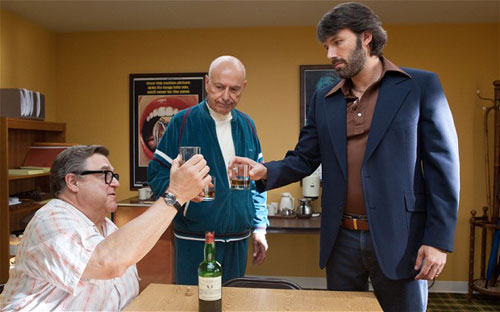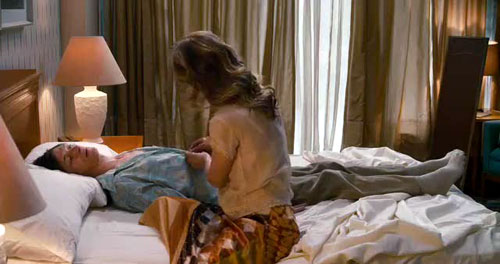|
Iran and the Middle East have been so explosively persistent in the news that it's hard to believe the Iran hostage crisis was 33 years ago. But even if it seemed distant, Ben Affleck's Argo brings it all back to terrifying life.
Based on the memoirs by Central Intelligence Agency operative Antonio J. Mendez, Argo tells the story, heretofore little-known, of one of the CIA's triumphs of the period. It sounds like the wildest spy fiction, but—minus a few liberties taken in the storytelling—it is completely true. Mendez (Affleck), pretending to be a movie producer and aided by two authentic Hollywood bigwigs, went into Tehran with the ostensible goal of scouting locations for a sci-fi movie. His real purpose was to rescue six diplomats who escaped the American Embassy and were secretly given sanctuary by the Canadian ambassador, Ken Taylor (Victor Garber).
George Clooney is one of the producers of Argo. That is fitting, because Affleck is following in Clooney's footsteps as an A-list leading man who has become an excellent director. Affleck had a brilliant first film, Gone Baby Gone, and a very fine second film, The Town. Argo, his third film, is a mesmerizing, state-of-the-art historical/political thriller. Like Charlie Wilson's War, it makes the political content thrilling and immediate; like Apollo 13, it takes an historical event, the outcome of which is already known to viewers, and makes it a matter of nail-biting suspense. Affleck might have picked up the pace in a couple of the scenes set in CIA headquarters, but that is a very minor complaint. When Mendez and his charges are sweating it out at the Tehran airport, hoping against hope the exit officials will accept their visas stating they are a Canadian film crew, you won't be thinking about anything else.
 |
What impressed me most about Argo is Affleck's attention to detail—fragmentary bits of human behavior that seem insignificant when described, but which add enormously to the film's cumulative impact. One detail I will never forget comes at the end of Affleck's recreation of the storming of the American Embassy: revolutionaries lead a secretary away, but as they do so, they remove her eyeglasses—a small action, but as shocking in context as if they had stripped her naked.
Argo is pretty much faultless on the technical level. Deserving special praise are screenwriter Chris Terrio, cinematographer Rodrigo Prieto, editor William Goldenberg, production designer Sharon Seymour and composer Alexandre Desplat. But the one who really deserves kudos is casting director Lora Kennedy; the pictures accompanying the end credits, comparing the images of the real rescued diplomats with those of the actors who play them, and you'll see what I mean.
As for Affleck, he cuts just as impressive a figure in front of the camera as he does behind it, in a brisk, charismatic lead performance. Mendez could be called the anti-James Bond; he's interested only in doing his job and saving lives, not in making himself the hero. (He's reminiscent of Philip Seymour Hoffman's Gust Avrakotos in Charlie Wilson's War, reinforcing the resemblance between the two films.) There's a great scene near the beginning in which Mendez shoots down, one by one, all the featherbrained rescue scenarios advanced by his CIA superiors—only to offer the one that's the wildest, yet by far the most workable, of all. (Affleck also looks great in his hippie hair and beard, once you get over the initial shock.)
 |
Argo's listed supporting cast on the Internet Movie Database numbers in the hundreds. Garber and Bryan Cranston, playing Mendez's boss Jack O'Donnell, are notable, but the ones who steal the movie are Alan Arkin and John Goodman, as the movie producer Lester Siegel and special effects wizard John Chambers. Together Arkin and Goodman provide exactly the jaunty, profane comic relief the story needs. (Siegel's battle cry for the mission is, "Argo fuck yourself!") Altogether, Argo is a thrilling, energizing movie, as well as heartening testimony of the co-operation and courage of U.S. and Canadian officials who worked together to avert a tragedy.
Two other current movies share with Argo a setting in the recent past. They don't resemble Argo, or for that matter each other, but both tell moving stories about unforgettable protagonists.
My colleague Kathi Wolfe has already written movingly for this publication about her friend, the late Mark O'Brien, and The Sessions, Ben Lewin's movie about an incident in O'Brien's life. Seeing the movie and reading Wolfe's article about O'Brien, I can only say I wish I had met him. Anyone who sees The Sessions, however, will feel they have met O'Brien, and will feel enriched by the experience.
The story of The Sessions would obviously be a tough sell to many audiences. Set in the late 1980s, The Sessions tells of how O'Brien—a polio victim from the age of six, left quadriplegic and unable to breathe without an iron lung—hires a sex surrogate for the express purpose of losing his virginity. Part of the film consists of the eponymous sessions between O'Brien (John Hawkes) and sex surrogate Cheryl (Helen Hunt). The rest of the movie consists mostly of scenes from both O'Brien's and Cheryl's daily lives, as well as O'Brien's counseling sessions with his priest, the nonplussed but understanding Father Brendan (William H. Macy).
 |
E.M. Forster once said that his most famous novel, A Passage to India, was not so much about the differences between East and West as the difficulty of living in the Universe. Something very similar can be said about The Sessions: it is not so much about sex as about the difficulty of living in the Universe, particularly for people such as O'Brien who have much more than their share of difficulty thrown their way. Not that The Sessions is heavy going; in fact, it is notable for its lightness of touch, represented by O'Brien's quirky, self-deprecating sense of humor.
The sessions between O'Brien and Cheryl, though not directly depicting any sex acts, are quite explicit as to nudity. But the nudity is far less important than the impact of the sessions on O'Brien and Cheryl. For O'Brien—a man who forged a successful career as a journalist and poet, despite being forced to live flat on his back on a gurney—the sessions mean nothing less than claiming a crucial part of his birthright as a human being. There is a scene toward the end of the film involving O'Brien, Cheryl, and a mirror. I will not describe it; I will leave you to see it for yourself, and experience its full impact.
 |
The acting in The Sessions goes beyond praise. Forced to rely solely on his face and voice, Hawkes creates one of the most unforgettable characters in the modern cinema, a character all the more moving for the realization that he really lived. Comparing Hawkes' O'Brien with his scary Uncle Teardrop in Winter's Bone, it's almost impossible to believe the same actor plays both roles. Hunt, an Academy Award winner for As Good as it Gets, far exceeds in The Sessions any other role I have seen her play. Her nakedness here goes far beyond the physical; this is a remarkably courageous performance in every way.
Ben Lewin, himself a polio victim, was excellently qualified to write and direct a movie that realistically depicted the life of a disabled person. As Wolfe has already noted, he succeeded brilliantly in that task. The Sessions is the story of a good, brave, gifted man who made his way in the world despite disabilities most of us could scarcely imagine. It is a wonderful film, as well as an outstanding act of advocacy.
The Perks of Being a Wallflower, Stephen Chbosky's film based on his 1999 epistolary novel, is a work of fiction, though it is compellingly real to millions of teen and young adult readers who know and cherish the book. I haven't read the book, but the movie is well worth seeing on various counts.
Set in the early 1990s, the novel and the movie unfold as a series of letters that Charlie (Logan Lerman), a Pittsburgh high-school freshman, writes to an anonymous friend. Shy and emotionally fragile, Charlie is a total washout in high school until he is taken up by step-siblings Sam (Emma Watson) and Patrick (Ezra Miller), seniors who lead the Bohemian clique at the school.
For the most part, The Perks of Being a Wallflower follows a familiar path for early-'90s coming-of-age stories, including everything from pot brownies to Rocky Horror Picture Showre-enactments. Carrying a major torch for Sam, Charlie makes other friends in his freshman year, including Mr. Anderson (Paul Rudd), an English teacher who sees Charlie's promise as a writer, and Mary Elizabeth (Mae Whitman), a senior who is a little too eager to help Charlie lose his virginity.
But although the similarities to John Hughes movies are apparent, The Perks of Being a Wallflower crosses into Salingeresque emotional territory. By accident, Charlie lets slip one night a major reason for his emotional fragility: his best friend Michael committed suicide just before freshman year. And then there's the story he isn't telling, about himself and his late Aunt Helen (Melanie Lynskey), who is seen in flashbacks.
Charlie's friends also have thorny problems—particularly the flamboyantly gay Patrick, in love with star football player Brad (Johnny Simmons), who—thanks to his bullying father and friends—refuses to come out of the closet.
I thought I would like The Perks of Being a Wallflower, but it moved me more deeply than I thought it would. The actors—particularly Lerman and Miller—deserve most of the credit. Both still only 20 as of this writing, Lerman and Miller are already screen veterans, and already they plumb depths of emotion more skillfully than some renowned actors twice their age. As with Ryan Gosling and Joseph Gordon-Levitt a decade before them, it will be interesting to see what Lerman and Miller accomplish in the decade of their twenties.
|